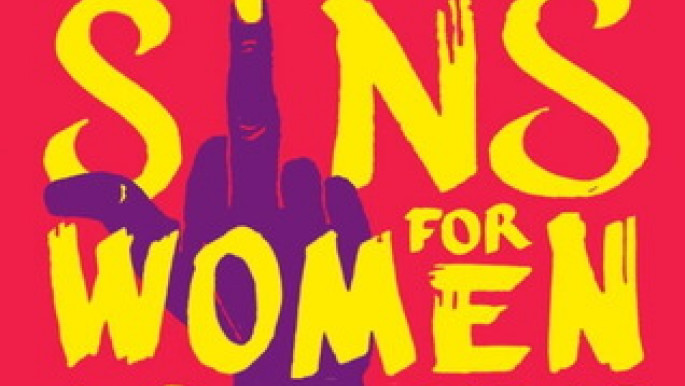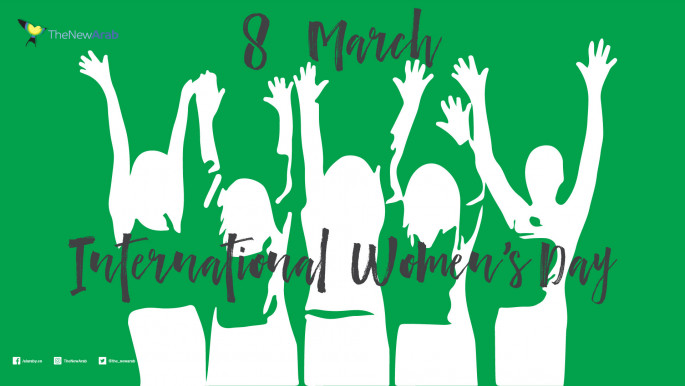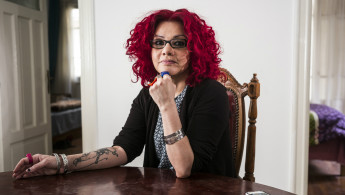Mona Eltahawy isn't here to be polite, she is here to smash the patriarchy
Mona Eltahawy does not mince words when it comes to talking about The Seven Necessary Sins for Women and Girls, published last September.
As the title suggests, her book is a manifesto that identifies the seven "sins" women and girls – including nonbinary and trans women – need in order to confront and dismantle patriarchal power structures around the world: anger, attention, profanity, ambition, power, violence and lust.
Weaving personal stories of violence and protest with stories from other women, Eltahawy contextualises them with data and history to show readers that women should strive to scare the patriarchy in order to gain the space they deserve, rather than appease or work with it.
"I am not here to play nice. I am not here to be polite. F**k polite, and f**k nice," Eltahawy tells The New Arab.
"I'm serving patriarchy. I'm putting it on notice that I'm here to terrify you. The patriarchy should be terrified because I'm here to f**k you over – that's what my book is."
 |
I'm serving patriarchy. I'm putting it on notice that I'm here to terrify you. The patriarchy should be terrified because I'm here to f**k you over – that's what my book is |  |
Whereas her 2015 debut, Headscarves and Hymens: Why the Middle East Needs a Sexual Revolution, saw Eltahawy tackle patriarchy, misogyny, and sex taboos in the Arab world, her latest book is a rallying call for global feminism.
Seven Necessary Sins is also a response to the lack of intersectionality in feminist critique.
|
"It's really important to me that feminist discourse, feminist critiques and fights against patriarchy happen by and for women of colour, feminists of colour, queer feminists of colour," the Egyptian-American writer and activist adds.
"I'm sick and tired of so much of feminist critique, of feminist analysis and discourse – for such a long time now – being produced by white feminists."
Eltahawy stressed that when she talked about patriarchy, she wasn't just talking about men per se. She said it was an ideology and system of oppression that privileges male dominance, and that it can be upheld by anyone – men or women – who benefits from proximity to patriarchy and power.
Seven Necessary Sins is a product of years' worth of ideas and arguments Eltahawy accumulated in handwritten notebooks or on Twitter – where many of her threads have gone viral.
In fact, she is credited for instigating the viral #MosqueMeToo and #WhyISayF**k hashtags – both of which influenced some chapters in Seven Necessary Sins.
She also pointed to three essays she wrote for NBC's opinion website which helped crystallise the idea behind the title.
"One essay was about anger, one was about attention, and one was about profanity and how all of those things are really important tools for women and girls and non-binary and queer people to use against patriarchy," Eltahawy reflected.
"So I thought, this is like the seven deadly sins, I should just make them into seven necessary sins and expand on them – and that's how the book came about."
Eltahawy highlighted one experience of when she was sexually harassed as a teenager during Hajj in Saudi Arabia, as an example of how women are constantly denied one of the seven sins.
The memory of this experience also sparked not just her own, but countless other #MosqueMeToo stories from women on Twitter.
 |
When you fight back, men accuse us of being too violent and overreacting and when you don't fight back because you're young, or you froze – perfectly normal reactions – we're accused of not fighting back |  |
"When I began #MosqueMeToo, people – men, especially – were asking why I didn't fight back," Eltahawy explains.
"When you fight back, men accuse us of being too violent and overreacting and when you don't fight back because you're young, or you froze – perfectly normal reactions – we're accused of not fighting back. It was this situation of damned if you do, damned if you don't.
"So I was like, f**k it. I'm just going to connect all the things that we've always been told not to do or want or be, and I'm going to say that these are exactly the things we should want to do and be because they're effective against f**king the patriarchy."
Read also: The Greater Freedom: Exploring 'The Invisible Jury' with Alya Mooro
When The New Arab spoke to Eltahawy, she had just completed a Feminist Giant World Tour to help promote Seven Necessary Sins, which saw her visit cities across North America, Europe and Africa.
She also visited Australia, where she appeared on Q&A in an all-female panel to coincide with a feminist ideas festival in Melbourne.
 |
How long must we wait for men and boys to stop murdering us, to stop beating us and to stop raping us? |  |
The TV programme was broadcast live on ABC, Australia's public broadcaster, and some of Eltahawy's responses to audience questions were sprinkled with profanity.
 |
|
| The Seven Necessary Sins for Women and Girls by Mona Eltahawy |
At one point she also said, "How long must we wait for men and boys to stop murdering us, to stop beating us and to stop raping us? How many rapists must we kill?"
While no stranger to controversy, Eltahawy's Q&A appearance sparked countless headlines, and ABC received at least 235 complaints for that episode alone.
It also prompted an independent investigation on whether it breached the editorial policies, and the episode was pulled from ABC's online streaming service.
Despite the backlash, Eltahawy stands by her comments.
"All I did was ask people to imagine this scenario of violence against men, because it's so horrific," she says.
"I insisted that the actual reality of day-to-day violence against women and girls and the rest of us is the real horror here, because that actually happens.
"But people in Australia, especially white, misogynist men… they took it to mean I was inciting violence. That just goes to show that the bootlickers or foot soldiers of patriarchy get more upset at imaginary violence against men, rather than actual day-to-day violence against women and girls and gender diverse people."
Nonetheless, Eltahawy's world tour was not all controversial. She recounted meeting people from all walks of life – including members of the Arab diaspora – who expressed admiration for her work.
It was also during this tour that Eltahawy cemented what has now essentially become a trademark in her talks and presentations: having crowds stand up, stick up their middle fingers, and chant "f**k the patriarchy".
The tradition started when she was in Nigeria for the Aké Arts and Book Festival.
"I've been there many times, so the audience is familiar with my work and incredibly receptive… they come to my talks knowing what to expect," she recounted.
 |
I asked everyone at the end to stand up and chant 'f**k the patriarchy' with me |  |
"But we were having an especially vibrant session where I was speaking with a Nigerian woman whose family is from the north, and we were talking about Seven Necessary Sins.
"And then I thought, you know what, let's do this… So I asked everyone at the end to stand up and chant 'f**k the patriarchy' with me. It was incredible. This was 300 people."
From there, it grew. She followed it up by making the Melbourne Town Hall audience of around 1,200 stand up after the broadcast of Q&A, and again in South Africa, where she gave the keynote speech as part of the Abantu Book Festival in Soweto.
It climaxed during the Women's March in Washington DC, after she was presented with the Global Vanguard Award.
"At the end of my talk, again, I asked everyone to stand up," Eltahawy says.
"This time we chanted 'f**k the patriarchy' three times, getting louder each time.
"For people who are uncomfortable with profanity, it's a way for them to get the comfort and the safety of a group saying it… I know they get a big kick out of it and this charge, you know? So, it has become my thing. I'm taking it around the world – and I love it."
The Seven Necessary Sins for Women and Girls by Mona Eltahawy is out now through Beacon Press.
Elias Jahshan is freelance writer based in London. He is a contributor to Arab, Australian, Other: Stories on Race & Identity, out now through Picador.
Follow him on Twitter: @Elias_Jahshan
Click on the Special Contents tab below to follow our special coverage for International Women's Day 2020:
 |
|



